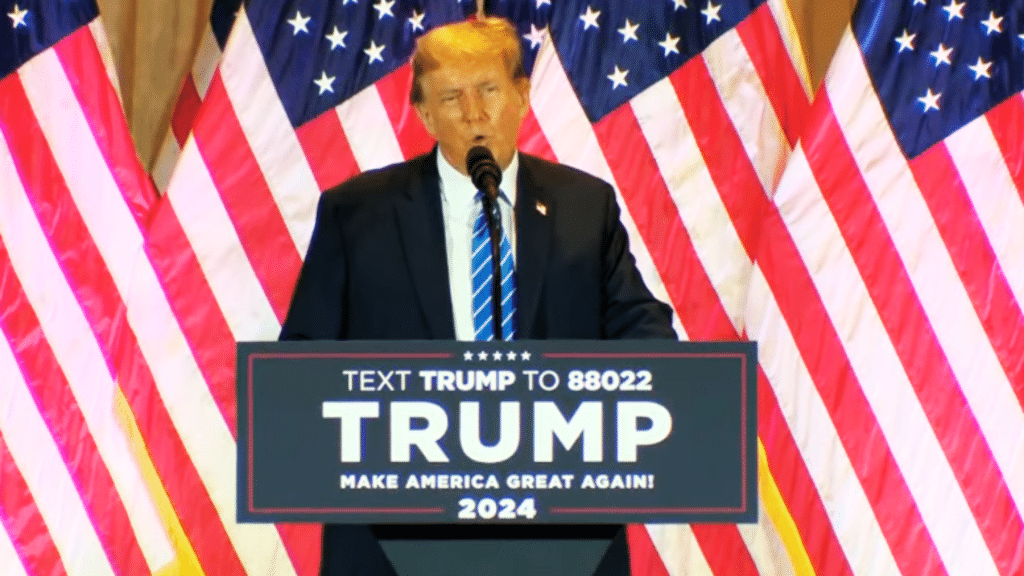Former President Donald Trump all but locked up the Republican presidential nomination for 2024 after completely dominating the March 5 Super Tuesday primaries, winning 14 out of the 15 states up for grabs — Virginia, North Carolina, Alabama, Maine, Massachusetts, Oklahoma, Tennessee, Texas, Arkansas, Colorado, Minnesota, Utah, California and Alaska — prompting former South Carolina GOP Gov. Nikki Haley to officially drop out of the race.
In so doing, Trump accomplished an historic political comeback and united the Republican Party all by himself through the biggest string of victories in a competitive primary in modern history, exhibiting all of the elements of the incumbency advantage even though he’s a former president.
In fact, so far in the Republican primaries and caucuses, Trump has garnered more than 8.2 million (and counting) votes as of this writing, to Haley’s 2.8 million. That’s about 74 percent to 25 percent, with Trump winning 22 states to Haley’s one. Now, with Haley out, Trump will win the other 27 states, too, by default.
When it’s official, it will be a Republican record in both popular vote margin and states won.
For comparison, in 2016, Trump only garnered 44.9 percent of the vote in the primaries to Ted Cruz’ 25.1 percent, winning 37 states. In 2012, Mitt Romney got 52.1 percent, winning 38 states. In 2008, John McCain got 46.7 percent, winning 31 states. In 2000, George W. Bush got 62 percent, winning 43 states. In 1996, Bob Dole got 58.8 percent, winning 44 states. In 1988, George H.W. Bush got 67.9 percent, winning 42 states. And in 1980, Ronald Reagan got 59.8 percent, winning 44 states. Those are all of the competitive primaries in modern history without a sitting president running for reelection.
That makes the 2024 Republican primary the least competitive, competitive primary ever in the GOP’s history since the modern primary system began in 1972. Only Al Gore’s winning all 50 states in 2000 over Bill Bradley with 75.8 percent of the vote for the Democratic nomination would be a bigger win, although it remains to be seen if Trump will end up with a bigger popular vote margin now that Haley’s out of the race.
This is what party unity looks like at the ballot box, Washington, D.C. establishment narratives to the contrary. Trump wasn’t anointed. He won fair and square by winning states. Haley really never had a chance. But neither did popular Florida Republican Gov. Ron DeSantis or the other candidates. Not against Trump.
While the incumbent President Joe Biden will undoubtedly still be difficult to defeat — there’s still a lot that could happen between now in November and incumbents win 69 percent of the time — Trump appears assured the GOP nomination with almost no opposition.
When it’s all over with, 49 to 1 in terms of states will show the GOP is completely united around Trump.
And that’s with many states like New Hampshire, South Carolina and others having held open primaries as they usually do, which with Haley on her way out of the race, Trump still complained about in a March 6 Truth Social post, stating, “Nikki Haley got TROUNCED last night, in record setting fashion, despite the fact that Democrats, for reasons unknown, are allowed to vote in Vermont, and various other Republican Primaries. Much of her money came from Radical Left Democrats, as did many of her voters, almost 50%, according to the polls.”
Despite Trump’s protests, crossover voters in the open primaries that Haley depended on had almost no impact in determining the outcome of any race in 2024, save Vermont. It’s hard to argue with the numbers, but despite his utter annihilation of his opponents, Trump’s light grousing about the process might just show what a perfectionist he is.
Don’t worry, Mr. President, there was never any doubt. Congratulations!
Robert Romano is the Vice President of Public Policy at Americans for Limited Government.








